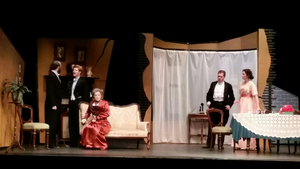 Reviewed by Barry Lenny, Thursday 15th August 2019.
Reviewed by Barry Lenny, Thursday 15th August 2019.
The Therry Dramatic Society is staging J. B. Priestley's
An Inspector Calls. I have a particular fondness for this work as it was the first play that I directed. This was Priestley's indictment of the British class system and the inequalities that it maintained, a modern morality play. It is still relevant in the light of the current Australian government's divide and conquer approach, demonising the poorest in the eyes of the not quite so poor and, thus, drawing attention away from the very rich and powerful, a system also perpetrated by other governments around the world.
The three-act play is set in the fictional town of Brumley during one evening in April 1912, the Edwardian era, when the British class structure was still strong. The Birling family are members of the upper-middle class, the new wealthy. Interestingly, it premiered in Russia in 1945, before being seen at The
Old Vic in England a year later. It has been on the English GCSE syllabus.
The well-to-do Birling family are sitting down to a celebratory dinner as their daughter, Sheila, is engaged to a business rival's son, Gerald Croft, when police Inspector Goole calls, announcing that he is investigating the suicide of a pregnant young woman,
Eva Smith, who also called herself Daisy Renton. They all claim, initially, that they have no idea who she is and ask why he is interrogating them. One by one, they admit to recognising her, and he recounts the part that each member of the family, including Gerald Croft, had in the lead-up to her tragic end.
The pompous and self-righteous head of the family, mill-owner, Arthur Birling, who has a habit of pontificating, is hoping for a knighthood. His son, Eric, is a petulant alcoholic with a temper, his wife, Sybil, is a snob with a false sense of superiority, his daughter is self-centred and vain, even narcissistic, Gerald is an entitled young man whose father has a title, his family are people in the old money category, and all of their faults are implicated in their actions that eventually led to the girl's suicide.
Director, Angela Short's interpretation has her cast feigning anger and shouting at each other for much of the time. It could use more light and shade. With that limitation, the initial acting was rather mechanical and it took a while before the characters appeared.
Patrick Clements plays Arthur Birling, affecting an unnaturally gravely voice, perhaps trying to sound older as the senior Birlings are in their fifties. One can only hope that his vocal cords last the distance. Sybil Birling is played by Rebecca Kemp, also playing an older character, as does Mark Drury as the Inspector, adding an extra level of difficulty to their performances. One wonders why some of Adelaide's more mature actors were not cast in these roles. These three gradually overcome the shouting and establish their characters, and are considerably more believable in the second half of the play.
Those playing the younger roles are the more successful characterisations, with Lani Gerbi, as Sheila, the first to establish a convincing character, closely followed by Matthew Chapman, as Gerald Croft, and Dylan O'Donnell, as Eric. Heather Riley fits the bill as the maid, Edna.
The makings of the production are there and just need to be refined, and the constant shouting moderated. With a few more runs this will, hopefully, develop further, the cast will add greater variation to the performance, and the characters will be there from the very start of the play, realising the potential of the work.
Add Your Comment
To post a comment, you must
register and
login.
 Reviewed by Barry Lenny, Thursday 15th August 2019.
Reviewed by Barry Lenny, Thursday 15th August 2019. Reviewed by Barry Lenny, Thursday 15th August 2019.
Reviewed by Barry Lenny, Thursday 15th August 2019.